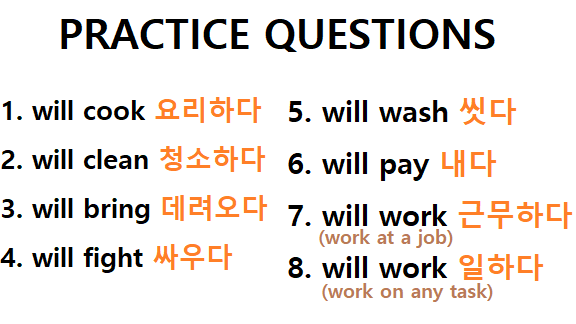Here is the 3rd lesson about the Korean future tense. This one is called the immediate future or the promised future. It is a form of the future tense so it means "will verb". But This form of the future tense has a very specific use. It is used when you are volunteering to do a favour for someone. It is a nice way to signal your willingness to be helpful.
You could even translate it as "will verb for you" Like "I will clean for you, I will cook for you, I will get it for you" You don't actually need to include the actual words for you. The for you part is implied when you speak in the immediate/promised future
To make the immediate future AKA promised future is a fairly simple task.
You start with an infinitive verb and cut off the 다 -da
Then if your verb ends in a vowel you add these endings
root verb-ㄹ 게 (casual)
root verb-ㄹ 게요 (polite)
root verb-ㄹ 겁니다 (formal)
so if you have the verb hada하다 you would conjugate it into
할게
할게요
할겁니다
and if your verb ends in a consonant you add these endings
root verb-을 게
root verb-을 게요
root verb-을 겁니다
so if you have the verb 씻다 you would conjugate it into
씻을게
씻을게요
씻을겁니다
THESE VERB ENDINGS ARE SPELLED WITH A SINGLE ㄱ. I WOULD CALL THIS THE OFFICIAL SPELLING. HOWEVER, IT IS ALWAYS PRONOUNCED LIKE A ㄲ AND SOMETIMES WRITTEN WITH ㄲ IN UNOFFICIAL COMMUNICATION LIKE TEXT MESSAGES WITH FRIENDS.
AND ONE MORE WEIRD THING. THIS SPACE HERE IS OPTIONAL. YOU'LL FIND THAT KOREANS ARE NOT ALL THAT STRICT ABOUT PUTTING SPACES BETWEEN THEIR WORDS.
AND ONE MORE OTHER WEIRD THING IS THE FORMAL FORM OF THE VERB HERE DOES NOT FOLLOW THE PATTERN ESTABLISHED BY THE CASUAL AND POLITE FORMS. THE VOWEL IN THE FRORMAL FORM IS AN ㅓ NOT AN ㅔ LIKE IN THE OTHER TWO. DON'T GET TRIPPED UP BY THIS.
and that is all there is to the immediate future. I have practice questions for you and I need to re-emphasize that this form of the future tense is only used when you are cheerfully agreeing to do something for someone else. Like when someone asks "Can you verb for me" and you want to say "yes, I'll verb for you". That's when you use immediate future! Or if someone asks "Who will help me?" and you say "I'll do it!" That's when you use the immediate future. "I'll do it!" "hal-gge-yo!".
